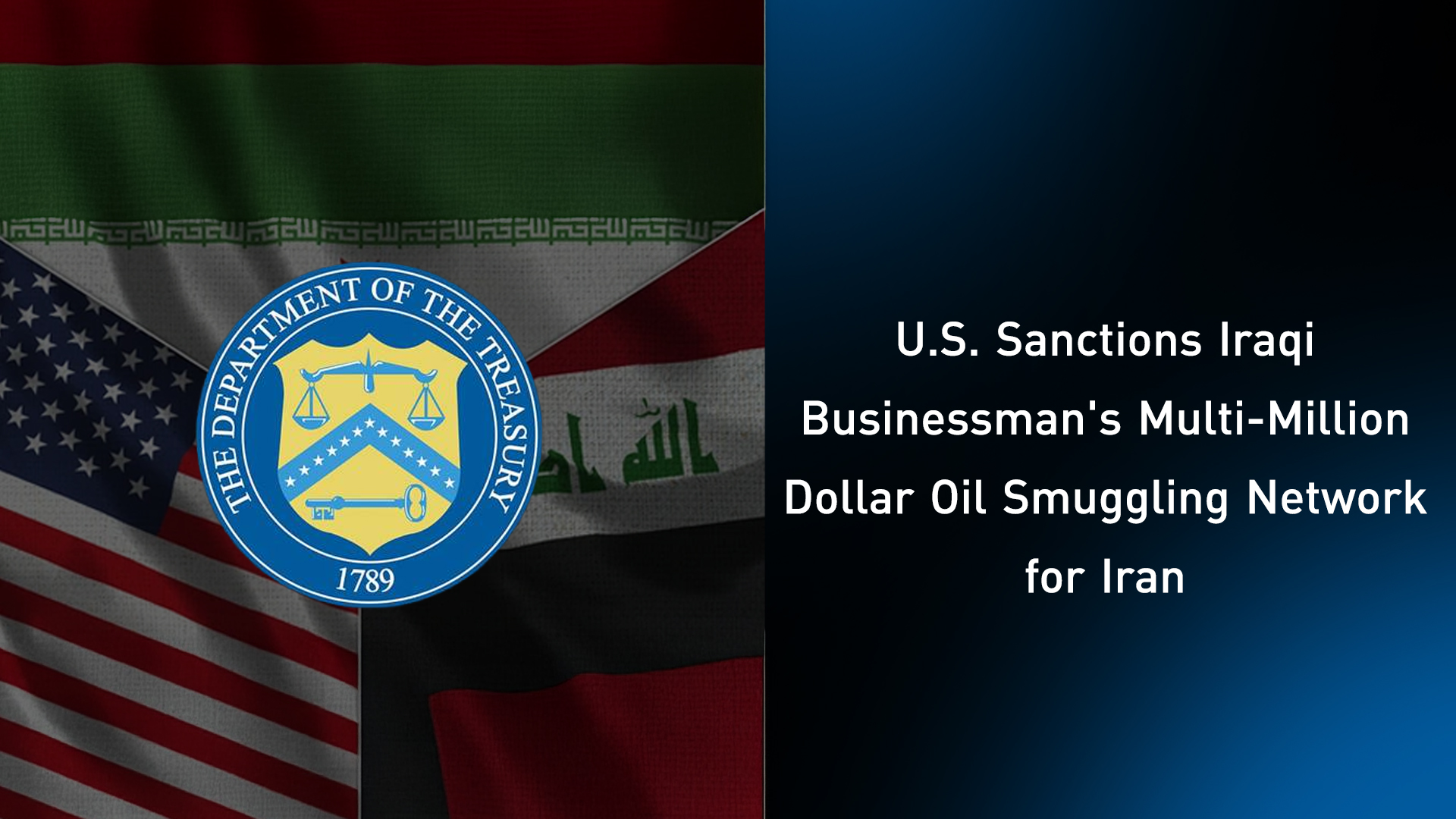U.S. Sanctions Iraqi Businessman's Multi-Million Dollar Oil Smuggling Network for Iran
US sanctions Iraqi businessman Waleed al-Samarra’i and his oil smuggling network for disguising Iranian oil as Iraqi crude, generating $300M annually for Tehran. Treasury says the scheme used ship-to-ship transfers and shell companies to evade sanctions.

ERBIL (Kurdistan24) – The United States Treasury Department announced on Thursday a sweeping sanctions package targeting a vast oil smuggling network operated by Iraqi-Kittitian businessman Waleed Khaled Hameed al-Samarra’i, accusing him of disguising Iranian oil as Iraqi crude to evade international sanctions.
The Treasury’s Office of Foreign Assets Control (OFAC) said the scheme, which generated an estimated $300 million annually for both Iran and al-Samarra’i, relied on covertly blending Iranian oil with Iraqi oil and marketing it internationally as of Iraqi origin.
“Iraq cannot become a safe haven for terrorists, which is why the United States is working to counter Iran’s influence in the country,” Treasury Secretary Scott Bessent declared. “By targeting Iran’s oil revenue stream, Treasury will further degrade the regime’s ability to carry out attacks against the United States and its allies. We remain committed to an oil supply free from Iran and will continue our efforts to disrupt Tehran’s evasion schemes.”
According to OFAC, al-Samarra’i operated primarily from the United Arab Emirates, using two companies—Babylon Navigation DMCC for logistics and shipping, and Galaxy Oil FZ LLC as the main global trader. Together, they managed a fleet of Liberia-flagged vessels, including the ADENA, LILIANA, CAMILLA, DELFINA, BIANCA, ROBERTA, ALEXANDRA, BELLAGIO, and PAOLA.
The ships engaged in ship-to-ship transfers at sea in the Arabian Gulf and in Iraqi ports, blending Iranian and Iraqi crude before selling it abroad. To obscure the origin, the vessels often spoofed their Automated Identification System (AIS), carried out nighttime transfers, and created reporting gaps.
To further conceal ownership, al-Samarra’i relied on a network of shell companies registered in the Marshall Islands, including Tryfo Navigation Inc., Keely Shiptrade Limited, Odiar Management S.A., Panarea Marine S.A., and Topsail Shipholding Inc.
OFAC designated al-Samarra’i, Babylon Navigation, and Galaxy Oil under Executive Order (E.O.) 13902, which targets Iran’s petroleum and petrochemical sectors. All related vessels and shell companies were also blacklisted.
The new sanctions block all property and interests in property of the designated persons in the United States or in possession of U.S. persons. Any entity owned 50 percent or more by sanctioned parties is likewise blocked.
U.S. authorities warned that foreign financial institutions risk secondary sanctions if they facilitate significant transactions for the listed individuals or companies. “The prohibitions include the provision of funds, goods, or services to or for the benefit of any designated entity,” OFAC stated, stressing that violators could face civil or criminal penalties.
Officials emphasized that the ultimate goal of sanctions is not punishment, but behavioral change, noting that entities may petition for removal from the sanctions list if they demonstrate compliance.
The U.S. Department of State echoed the Treasury’s measures in a statement issued on Sept. 2, 2025. Principal Deputy Spokesperson Thomas “Tommy” Pigott said Washington was acting decisively “to stem the flow of revenues to the Iranian regime for its destructive and destabilizing conduct in Iraq, the Middle East, and around the world.”
Pigott stressed that the sanctions on al-Samarra’i and his network were part of the National Security Presidential Memorandum 2, which directs maximum pressure on Tehran. “We will not hesitate to utilize all available tools at our disposal to counter those who enable Iran’s illicit oil trade,” the statement added.
Thursday’s action follows the July 3, 2025 sanctions targeting another smuggling network led by Salim Ahmed Said, which also relied on blending Iranian and Iraqi oil. Together, these moves form part of Washington’s broader campaign to curb Tehran’s access to hard currency and restrict its influence in Iraq.
The timing of the announcement comes as U.S. financial pressure increasingly reverberates through Iraq’s fragile economy.
On Aug. 19, 2025, Kurdistan24 reported that a long-negotiated gas deal between Iraq and Turkmenistan collapsed under U.S. sanctions pressure. The agreement, meant to deliver 20 million cubic meters of gas daily via Iran to generate over 2,000 megawatts of electricity, was derailed after Washington refused to approve the arrangement, fearing it would benefit Tehran.
Energy analyst Shahriyar Shekhlar told Kurdistan24 that while the contract could have alleviated some of Iraq’s electricity shortfall, U.S. sanctions have left Baghdad unable to pursue the deal. “This deadlock shows Iraq’s dependence on external actors for energy, and its inability to harness its own vast resources due to political mismanagement,” he said.
The oil smuggling crackdown also follows a wave of financial sanctions. On Aug. 6, 2025, the ECO Iraq Observatory reported that 35 out of Iraq’s 72 banks had come under U.S. sanctions, largely for dollar transaction violations or dealings with blacklisted entities. The move has already strained Iraq’s financial system and increased tensions between Baghdad and Washington.
With oil smuggling networks disrupted, energy agreements collapsing, and banks under sanctions, Iraq faces a mounting economic dilemma. On one side, U.S. pressure seeks to dismantle Iranian revenue streams and influence; on the other, Baghdad’s energy shortages and financial fragility leave it struggling to sustain basic services.
Analysts warn that while the U.S. seeks to isolate Iran, Iraq risks being destabilized as collateral damage, trapped between Washington’s maximum pressure strategy and Tehran’s entrenched networks.